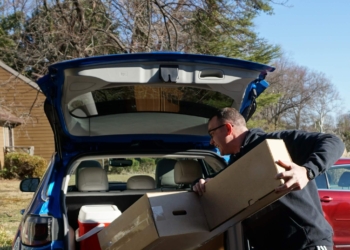The 2018 military moving season earned the unwelcomed distinction of being the “worst ever” as military families flooded social media with horror stories of household goods moves gone wrong.
Kerry Nichols was one of those voices. Nichols’ final military move occurred last May after her husband retired from the Army. He had accepted a job at Seymour Johnson Air Force Base, necessitating one last permanent change of station, from Belton, Texas, to Raleigh, N.C.
“We’ve had some bad moves, but this one went out with a bang,” Nichols said.
Damage to their household goods included a ripped leather sofa, love seat and fabric sectional, a crushed bed sideboard and headboard, shattered dishes, a damaged antique phone and bridal portrait — both of which were boxed with garage items — as well as holes in walls and a damaged driveway. Their damage estimate totaled $14,330.
“We didn’t realize until we got our stuff in North Carolina how awful it was,” she said. “I think the reason our move went so bad is we had this trifecta of horrible. The packers were horrible, the movers on the other end (Texas) were horrible and the movers here were the absolute worst movers I have seen in my entire life.”
Eight months later, they had yet to receive a reimbursement.
“I don’t know how they can do this to people,” said Nichols, who in February lamented that the claims inspector who arrived at their house months earlier had inspected only three items because no other damage was noted on his list.

The Defense Personal Property Program, managed by the U.S. Transportation Command, is searching for ways to avoid a repeat of last year’s ragged peak relocation season that runs from mid-May to Sept. 30. At the top of their list is a move to privatize the military moving system. This proposal, announced in February, would result in the Defense Department hiring a commercial personal property transport company to manage the roughly 420,000 shipments authorized each year. TRANSCOM’s goal is to unveil a privatized system by the start of the peak summer moving season in 2021.
TRANSCOM officials argue privatization would lead to improved “accountability and transparency.” Plus, TRANSCOM says other claims reduction initiatives are underway including:
-
Crating more household goods shipments. As of mid-January 2019, household goods shipments are being crated if they meet specific criteria like a move more than 800 miles, an estimated weight of 3,000 pounds or less in non-peak season and 7,500 pounds or less in peak season, do not have a direct delivery address at time of booking or upon acceptance of shipment, and do not include extra-large items unable to fit in a standard container.
-
Changing Defense Transportation Regulations to increase quality assurance inspections of PCS shipments. The new standard will require that no less than 50% (with an overall goal of 100%) of all inbound and outbound personal property shipments to be inspected. As service branches ramp up to this new requirement, the physical inspection rate was 25.2% for December 2018 across all military branches.
-
Publishing moving company satisfaction scores, although specific details about it are not yet known.
-
Rolling out in May a 24/7 hotline available to any DOD member experiencing issues with any aspect of their household goods moving process.
-
Piloting a new online personal property customer moving portal, called MilMove (My.Move.mil), that would replace Move.mil.
-
Introducing a standardized training manual for use by personal property personnel in all service branches.
If this spring’s reform efforts improve the moving process, military families may have Army veteran and military spouse Megan Harless to thank. Harless brought widespread media attention to the current state of military moves when she posted an open letter to elected officials last August on her blog, “Military Spouse Chronicles,” that included a link to a petition to the Secretaries of the Armed Forces and Congress.
Harless challenged military leaders and members of Congress to hold moving companies accountable for the damage they cause to possessions and the heartache they bring to families.
The petition gained nearly 105,000 signatures and created a ripple effect that drew the attention of Army officials and Montana Senator Jon Tester’s office. Tester ultimately joined with senators Lisa Murkowski, R-Alaska; Tim Kaine, D-Va.; and James Lankford, D-Okla.; in writing a Sept. 27, 2018, letter to TRANSCOM calling out the “mismanagement and inefficiency” of PCS transportation service providers and is demanding a written report by March 30, 2019, providing answers to more than a half-dozen questions they raised. The House Armed Services Committee sent a similar letter.
Harless now finds herself at the tip-of-the-spear as a recognized voice for military families demanding an improved PCS system. She serves on an informal TRANSCOM advisory board that includes Movers Association and Storage Warehouse Association representatives and other key transportation officials. Harless says the panel is discussing ways to improve the PCS process for both transportation providers and military families, but was not asked to weigh in on the privatization proposal. Harless also has made the rounds in Washington, D.C., meeting with congressional leaders and second lady Karen Pence’s office to bring them first person accounts of the problems plaguing military moves.

Military and transportation officials have cited a nationwide shortage of truck drivers and other moving personnel such as packers and loaders for the delays, communication problems and quality issues many military families experienced during last summer’s moving season.
When Harless posted her Open Letter on her “Military Chronicles” Facebook page, she was inundated with comments from military spouses and service members who described their own dreadful moving experiences. She also received some pushback from former military spouses and veterans working in the military transportation industry.
Air Force veteran David Shelton, who works as an over-the-road driver with Suddath United, took issue with the blanket criticism of the moving industry on social media that followed Harless’ Facebook post. He contends many of the problems with damage during military moves can be traced to “local agencies,” which handle the pack out and warehouse storage near bases.
“Uncle Sam is at fault for two reasons,” Shelton said, who also grew up in a military family. “Trying to move everybody in a three-month period instead of spreading it out during the year. If little Johnny and little Suzie have to miss a couple of weeks of school, it was OK back in the day when we moved. It is OK today.”
“The military is at fault for that and picking the local agencies to do the packing,” added Shelton, who maintains the DOD need to provide better oversight over the local moving companies it uses.
Army Maj. David Dunn, spokesman for TRANSCOM, states the number of claims military personnel filed in 2018 was “comparable to claims date for the past three years” and on par with the moving industry average. In 2018, the DOD authorized 334,324 household goods and unaccompanied baggage shipments, with 49% of CONUS shipments door-to-door and 51% storage-in-transit. Only 33% of overseas moves were door-to-door.
“The annual claim rate for household goods shipments is 21 percent,” Dunn said in an email. “This number is consistent with the industry average (non-military claims). The average amount per claim is $2,692, comparable to the past three years.”

Karie Wallace, general manager for Arrow Moving and Storage in San Antonio, has seen all sides of the moving industry, first as a military spouse and then as an employee in office, operations and management portions of the business. While she acknowledges some military members experience bad moves and improvements need to be made to the PCS process, Wallace maintains, “Not every moving company is horrible. There are always three sides to every story. A, B, and the truth lies somewhere in the middle.”
Wallace points out the DOD holds moving companies and crews accountable for damage to shipments.
“When they say we’re not held to a higher standard, we pay for those [damaged] items. The company does or the crew does,” Wallace explained. “When a claim comes through on an item, it gets deducted out of the employee’s paycheck if we can prove they were at fault. They are held to a standard and they know if they don’t treat the furniture well, they are paying for that furniture.”
Shelton and Wallace both maintain military families also can take steps to improve the PCS process. Here are some of their tips:
-
No matter how often you’ve moved, review PCS tutorials at Move.mil and look over additional moving information at Military OneSource’s website and from your local Personal Property Processing Office to ensure you understand your entailments and DOD regulations. Know what items need to be disassembled and reassembled by the homeowner.
-
Clean and tidy your house before movers arrive. Make sure all clothes, dishes and other items to be packed are clean. Throw away garbage.
-
Leave open self-packed boxes so movers can verify items are packed properly.
-
Make sure high-value inventory form is filled out and boxes with fragile and high-value items are labeled clearly for loaders. Ask drivers to provide extra moving pads for high-value items.
-
Get your truck driver’s name and contact information and communicate with the driver throughout the moving process.
-
Complete the Customer Satisfaction Survey.







































